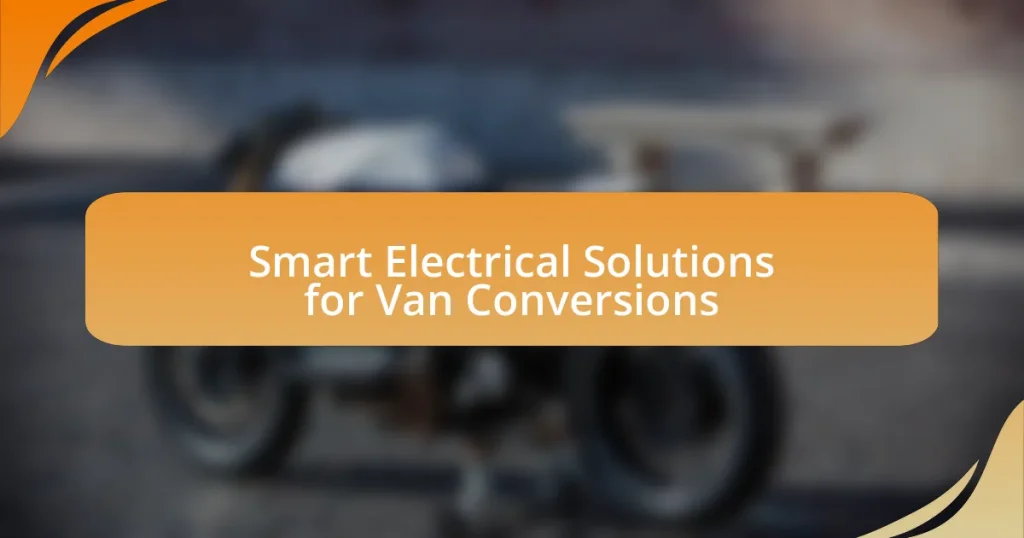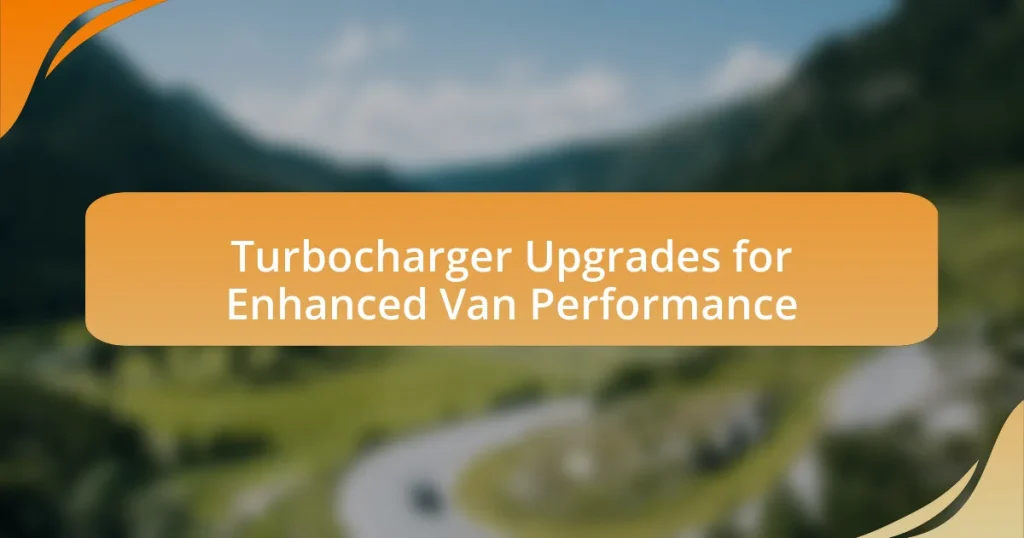Smart Electrical Solutions for van conversions encompass advanced technologies such as lithium-ion battery systems, solar power integration, and energy management systems. These solutions enhance energy efficiency, extend the lifespan of electrical components, and improve overall functionality, allowing van owners to power appliances sustainably and achieve off-grid capabilities. Key components include solar panels, smart inverters, and monitoring systems that optimize energy usage and provide real-time tracking of consumption. The article explores the specific technologies involved, their advantages, best practices for integration, and troubleshooting tips to maintain these systems effectively.
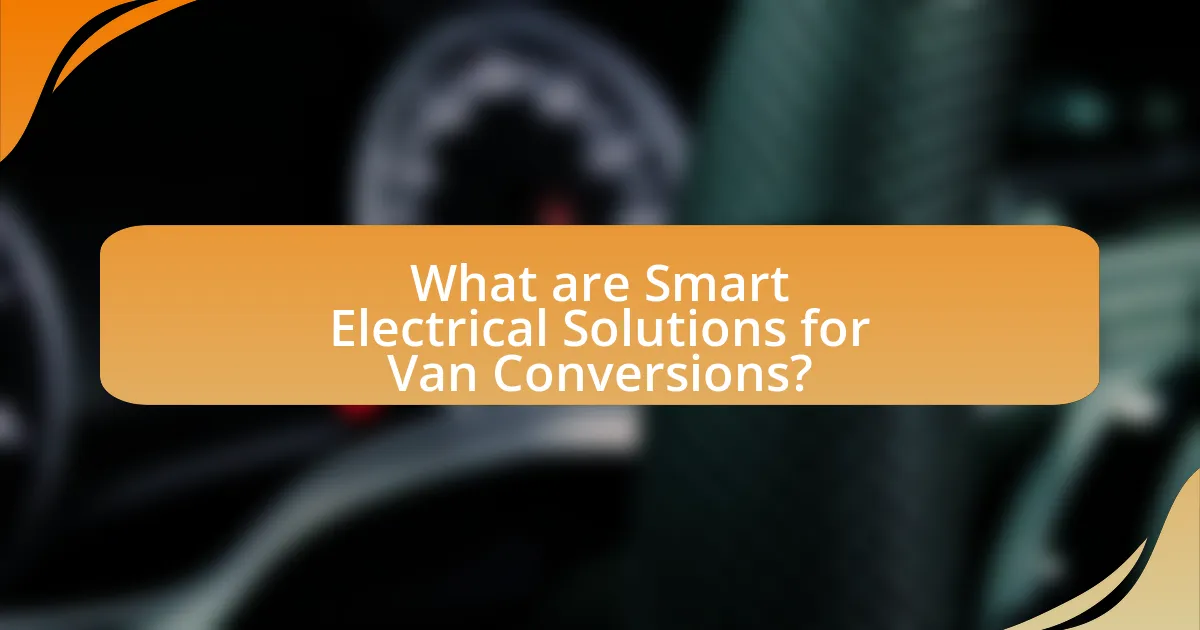
What are Smart Electrical Solutions for Van Conversions?
Smart electrical solutions for van conversions include advanced battery systems, solar power integration, and efficient energy management systems. These solutions enable van owners to optimize energy use, extend the lifespan of electrical components, and enhance overall functionality. For instance, lithium-ion batteries provide higher energy density and longer life cycles compared to traditional lead-acid batteries, making them ideal for mobile living. Additionally, solar panels can be installed on the roof to harness renewable energy, allowing for off-grid capabilities. Energy management systems, such as smart inverters and monitoring apps, help users track energy consumption and production, ensuring efficient use of resources. These technologies collectively improve the sustainability and convenience of van conversions.
How do Smart Electrical Solutions enhance van conversions?
Smart Electrical Solutions enhance van conversions by providing efficient energy management, enabling users to power appliances and devices sustainably. These solutions often include advanced battery systems, solar panels, and smart inverters that optimize energy usage, allowing for longer off-grid capabilities. For instance, integrating a lithium-ion battery system can increase energy storage capacity by up to 70% compared to traditional lead-acid batteries, resulting in improved performance and reliability. Additionally, smart monitoring systems allow users to track energy consumption in real-time, ensuring that power is used effectively and reducing waste. This combination of technologies not only maximizes the functionality of the van but also enhances the overall user experience by providing greater autonomy and comfort during travel.
What specific technologies are included in Smart Electrical Solutions?
Smart Electrical Solutions for van conversions typically include technologies such as solar power systems, lithium-ion battery storage, smart energy management systems, and advanced inverter technology. Solar power systems harness renewable energy, while lithium-ion batteries provide efficient energy storage with a longer lifespan compared to traditional batteries. Smart energy management systems optimize energy usage and distribution, ensuring that power is used efficiently throughout the van. Advanced inverter technology converts DC power from batteries to AC power for appliances, enhancing the versatility of electrical systems in van conversions.
How do these technologies improve energy efficiency in vans?
Smart electrical solutions improve energy efficiency in vans by optimizing power consumption and enhancing energy management. Technologies such as advanced battery systems, energy-efficient appliances, and smart energy monitoring systems allow for better utilization of available energy. For instance, lithium-ion batteries provide higher energy density and longer life cycles compared to traditional lead-acid batteries, reducing the frequency of replacements and energy waste. Additionally, energy-efficient appliances consume less power, which directly lowers overall energy demand. Smart energy monitoring systems enable real-time tracking of energy usage, allowing users to identify inefficiencies and adjust their consumption patterns accordingly. These combined technologies lead to significant reductions in energy waste and improved overall efficiency in van conversions.
What are the key components of Smart Electrical Solutions?
The key components of Smart Electrical Solutions include energy management systems, solar power integration, battery storage, and smart appliances. Energy management systems optimize energy usage and monitor consumption, while solar power integration allows for renewable energy generation. Battery storage systems provide backup power and enhance energy efficiency, and smart appliances enable automation and remote control, improving convenience and energy savings. These components work together to create an efficient and sustainable electrical system for van conversions.
What role do solar panels play in van electrical systems?
Solar panels serve as a primary energy source in van electrical systems by converting sunlight into electricity. This electricity is used to power various appliances and devices within the van, such as lights, refrigerators, and charging ports. By harnessing solar energy, van owners can achieve greater energy independence and reduce reliance on traditional power sources, which is particularly beneficial during extended trips or off-grid camping. Studies indicate that a typical solar panel system can generate between 300 to 800 watts of power, depending on the size and efficiency of the panels, thus providing sufficient energy for essential van functions.
How do batteries and inverters contribute to smart electrical setups?
Batteries and inverters are essential components of smart electrical setups, as they enable efficient energy storage and conversion for various applications. Batteries store energy generated from renewable sources, such as solar panels, ensuring a reliable power supply even when generation is low. Inverters convert the stored DC power from batteries into AC power, making it usable for standard appliances and devices. This combination allows for optimized energy management, reducing reliance on traditional power sources and enhancing the overall efficiency of electrical systems in van conversions. For instance, a study by the National Renewable Energy Laboratory highlights that integrating batteries and inverters can improve energy efficiency by up to 30% in mobile applications.
What are the advantages of implementing Smart Electrical Solutions in van conversions?
Implementing Smart Electrical Solutions in van conversions enhances energy efficiency, convenience, and system management. These solutions allow for optimized power usage through smart monitoring and control systems, which can reduce energy waste by up to 30%. Additionally, they enable remote access and automation of electrical systems, improving user experience and safety. Smart solutions often integrate with renewable energy sources, such as solar panels, further increasing sustainability. The combination of these features leads to a more reliable and user-friendly electrical system in van conversions.
How do these solutions increase the overall functionality of a van?
Smart electrical solutions enhance the overall functionality of a van by providing efficient power management, enabling advanced technology integration, and improving user convenience. These solutions, such as solar panels, battery management systems, and smart lighting, allow for off-grid capabilities, ensuring that users can operate appliances and devices without relying solely on traditional power sources. For instance, solar panels can generate renewable energy, which can be stored in batteries for later use, thus extending the van’s usability during trips. Additionally, smart lighting systems can be controlled remotely, offering customizable ambiance and energy savings. These enhancements lead to a more versatile and comfortable living space, making the van suitable for various activities, from camping to mobile workspaces.
What cost savings can be expected from using Smart Electrical Solutions?
Using Smart Electrical Solutions can lead to significant cost savings, primarily through reduced energy consumption and lower utility bills. These solutions often incorporate energy-efficient technologies, such as LED lighting and advanced battery management systems, which can decrease energy usage by up to 30% compared to traditional systems. Additionally, the integration of smart monitoring tools allows for real-time tracking of energy consumption, enabling users to identify and eliminate wasteful practices. This proactive approach not only enhances efficiency but also extends the lifespan of electrical components, reducing maintenance and replacement costs over time.
How can one transition from traditional to smart electrical systems in van conversions?
To transition from traditional to smart electrical systems in van conversions, one should integrate advanced components such as smart batteries, programmable controllers, and mobile app interfaces. This integration allows for real-time monitoring and control of energy consumption, enhancing efficiency and convenience. For instance, using a smart battery management system enables users to optimize charging cycles and track energy usage through an app, which can lead to a 20-30% increase in energy efficiency compared to traditional systems. Additionally, incorporating solar panels with smart inverters can provide renewable energy sources, further reducing reliance on conventional power.
What are the common challenges faced during the installation of Smart Electrical Solutions?
Common challenges faced during the installation of Smart Electrical Solutions include compatibility issues with existing electrical systems, complexity in wiring and configuration, and the need for specialized tools and knowledge. Compatibility issues arise when integrating smart solutions with older systems, which may not support modern technology. The complexity of wiring and configuration can lead to errors if not properly managed, as smart systems often require precise connections and settings. Additionally, the installation process may necessitate specialized tools and expertise, which can increase costs and time. These challenges highlight the importance of thorough planning and skilled labor in the successful implementation of smart electrical solutions.
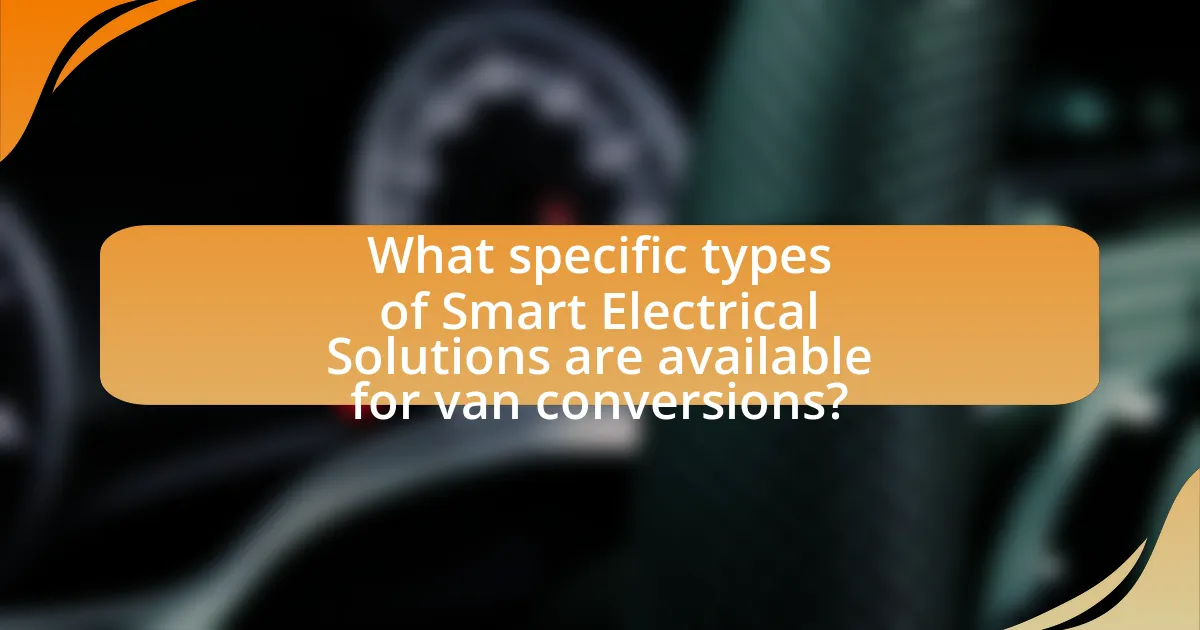
What specific types of Smart Electrical Solutions are available for van conversions?
Smart electrical solutions for van conversions include solar power systems, battery management systems, smart lighting, and energy monitoring systems. Solar power systems harness sunlight to generate electricity, providing a renewable energy source for van appliances. Battery management systems optimize the charging and discharging of batteries, ensuring efficient energy use and prolonging battery life. Smart lighting solutions utilize LED technology and can be controlled remotely or via sensors, enhancing energy efficiency. Energy monitoring systems track power consumption in real-time, allowing users to manage their energy use effectively. These solutions collectively enhance the functionality and sustainability of van conversions.
What are the different types of batteries used in smart van electrical systems?
The different types of batteries used in smart van electrical systems include lithium-ion batteries, lead-acid batteries, and lithium iron phosphate (LiFePO4) batteries. Lithium-ion batteries are favored for their high energy density, lightweight, and longer lifespan, making them suitable for applications requiring efficient power storage. Lead-acid batteries are commonly used due to their lower cost and established technology, although they are heavier and have a shorter cycle life compared to lithium options. Lithium iron phosphate batteries offer enhanced safety and thermal stability, along with a longer cycle life, making them an excellent choice for smart van systems that prioritize reliability and performance.
How do lithium batteries compare to lead-acid batteries for van conversions?
Lithium batteries outperform lead-acid batteries for van conversions in several key areas, including weight, lifespan, efficiency, and charging speed. Lithium batteries are significantly lighter, which contributes to better vehicle performance and fuel efficiency; they can weigh up to 70% less than lead-acid counterparts. Additionally, lithium batteries have a lifespan of 10 to 15 years, compared to 3 to 5 years for lead-acid batteries, resulting in lower replacement costs over time.
In terms of efficiency, lithium batteries can be discharged to a lower percentage without damage, typically around 80-90%, while lead-acid batteries should not be discharged below 50% to avoid shortening their lifespan. Furthermore, lithium batteries charge much faster, often reaching full charge in a few hours, whereas lead-acid batteries can take significantly longer. These advantages make lithium batteries a more suitable choice for the demands of van conversions, where space, weight, and reliability are critical factors.
What are the best practices for battery maintenance in van conversions?
The best practices for battery maintenance in van conversions include regularly checking battery voltage, ensuring proper charging, maintaining clean terminals, and monitoring temperature. Regular voltage checks help identify any issues early, as batteries should typically maintain a voltage above 12.4 volts for lead-acid types. Proper charging is crucial; using a quality charger that matches the battery type prevents overcharging and extends lifespan. Clean terminals prevent corrosion, which can impede performance, while monitoring temperature ensures batteries operate within safe limits, as extreme heat or cold can affect efficiency and longevity. Following these practices can significantly enhance battery performance and lifespan in van conversions.
What types of solar panel systems are suitable for van conversions?
The types of solar panel systems suitable for van conversions include monocrystalline, polycrystalline, and thin-film solar panels. Monocrystalline panels are known for their high efficiency and space-saving design, making them ideal for limited roof space in vans. Polycrystalline panels are generally less expensive and slightly less efficient, but they still provide a good balance of performance and cost. Thin-film solar panels are lightweight and flexible, which can be advantageous for certain van designs, although they typically have lower efficiency compared to the other two types. These options allow van owners to select a solar panel system that best fits their energy needs and available installation space.
How do flexible solar panels differ from rigid solar panels for vans?
Flexible solar panels differ from rigid solar panels for vans primarily in their construction and installation flexibility. Flexible panels are lightweight, can conform to curved surfaces, and are often adhered directly to the van’s roof, making them ideal for space-constrained installations. In contrast, rigid panels are heavier, require mounting brackets, and are typically more durable but less adaptable to varying surfaces. The flexibility of the panels allows for easier integration into the van’s design, while the rigidity offers higher efficiency and longevity under harsh conditions.
What factors should be considered when choosing solar panel size and capacity?
When choosing solar panel size and capacity, key factors include energy consumption needs, available roof space, and local solar insolation levels. Energy consumption needs dictate the total wattage required to power appliances and devices in the van, which can be calculated by assessing daily energy usage in watt-hours. Available roof space limits the number and size of solar panels that can be installed, as larger panels generate more power but require more area. Local solar insolation levels, measured in peak sun hours, influence how much energy the panels can produce; regions with higher insolation can benefit from smaller systems while still meeting energy demands.
What smart technology options are available for van electrical systems?
Smart technology options available for van electrical systems include solar power systems, smart battery management systems, and advanced energy monitoring solutions. Solar power systems allow for renewable energy generation, enabling off-grid capabilities and reducing reliance on traditional power sources. Smart battery management systems optimize battery performance and lifespan by monitoring charge cycles and energy usage, while advanced energy monitoring solutions provide real-time data on energy consumption, helping users manage their power needs efficiently. These technologies enhance the functionality and sustainability of van electrical systems, making them ideal for modern van conversions.
How can smart monitoring systems optimize energy usage in vans?
Smart monitoring systems optimize energy usage in vans by continuously tracking energy consumption and adjusting power distribution in real-time. These systems utilize sensors and data analytics to identify energy usage patterns, enabling efficient management of resources such as lighting, heating, and appliances. For instance, a study by the International Energy Agency found that smart energy management systems can reduce energy consumption by up to 30% in mobile applications. By implementing predictive algorithms, these systems can also forecast energy needs based on usage trends, ensuring that energy is used only when necessary, further enhancing efficiency.
What role do smart chargers play in van electrical systems?
Smart chargers are essential components in van electrical systems, as they optimize battery charging and management. These devices intelligently adjust the charging process based on battery status, ensuring efficient energy use and prolonging battery life. For instance, smart chargers can prevent overcharging and overheating by monitoring voltage and temperature, which is crucial for maintaining the health of lithium-ion batteries commonly used in vans. Additionally, they can integrate with solar panels and other energy sources, allowing for seamless energy management and maximizing the use of renewable energy.
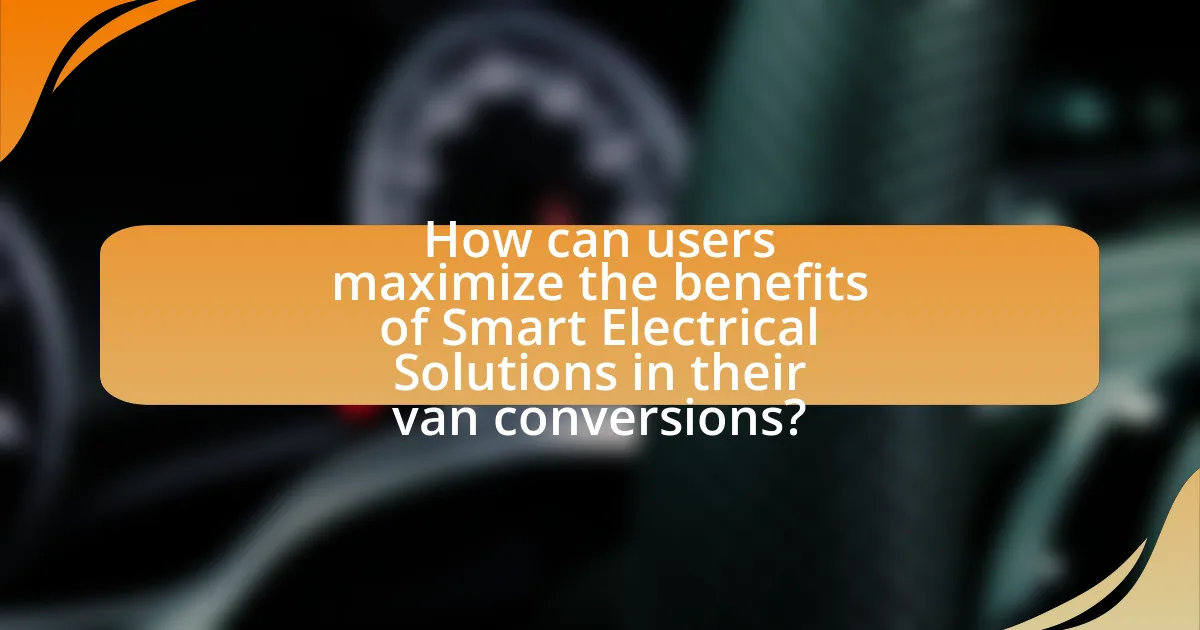
How can users maximize the benefits of Smart Electrical Solutions in their van conversions?
Users can maximize the benefits of Smart Electrical Solutions in their van conversions by integrating advanced energy management systems that optimize power usage and enhance efficiency. These systems allow users to monitor energy consumption in real-time, ensuring that power is allocated effectively to essential appliances and devices. For instance, utilizing solar panels in conjunction with smart battery management systems can significantly extend the range of electrical capabilities in a van, allowing for off-grid living. Research indicates that implementing such systems can increase energy efficiency by up to 30%, thereby reducing reliance on external power sources and enhancing overall sustainability in van conversions.
What are the best practices for integrating Smart Electrical Solutions into a van?
The best practices for integrating Smart Electrical Solutions into a van include careful planning of the electrical layout, selecting high-quality components, and ensuring proper safety measures. First, planning the electrical layout involves mapping out the power requirements for all devices, such as lights, appliances, and charging ports, to ensure adequate power supply and distribution. Second, using high-quality components, such as smart batteries, inverters, and solar panels, enhances reliability and efficiency, as evidenced by studies showing that quality components can improve energy management by up to 30%. Lastly, implementing safety measures, including circuit breakers and proper wiring techniques, minimizes risks of electrical failures and fires, which are critical in confined spaces like vans.
What troubleshooting tips can help maintain Smart Electrical Solutions in vans?
To maintain Smart Electrical Solutions in vans, regularly inspect wiring for wear and tear, ensuring all connections are secure and free from corrosion. This proactive approach prevents electrical failures and enhances system reliability. Additionally, monitoring battery health and charge levels is crucial; using a battery management system can provide real-time data on performance and longevity. Regularly checking fuses and circuit breakers for functionality also helps identify potential issues before they escalate. Implementing these troubleshooting tips can significantly extend the lifespan and efficiency of electrical systems in van conversions.
